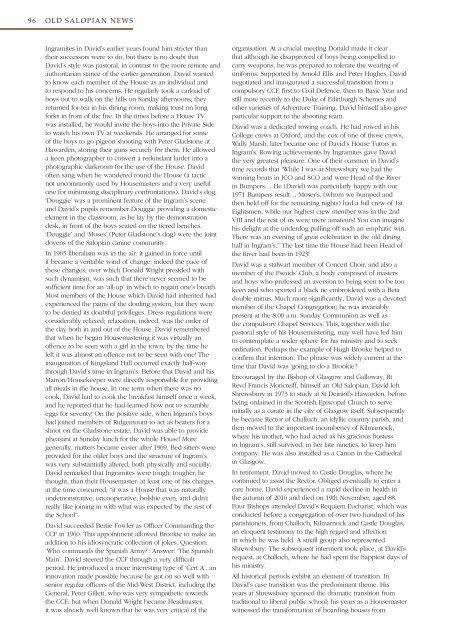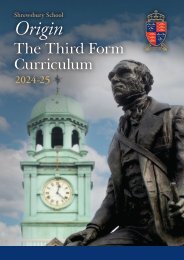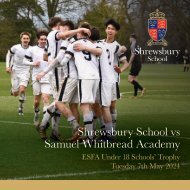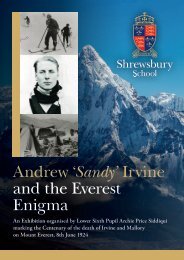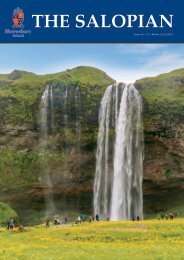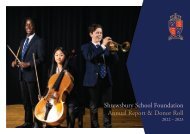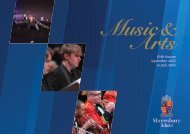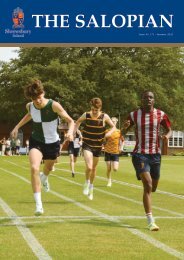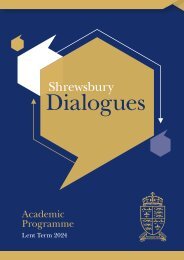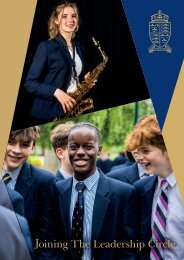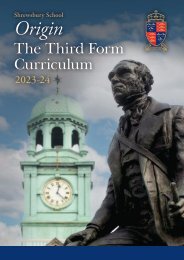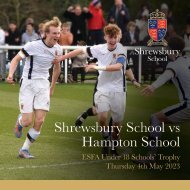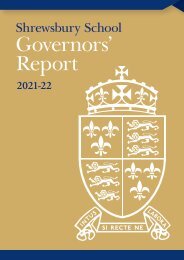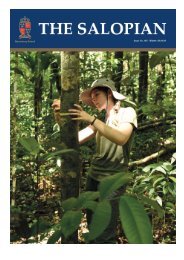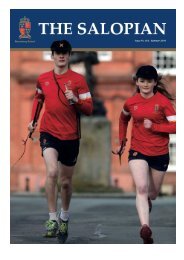The Salopian no. 160 - Summer 2017
- No tags were found...
Create successful ePaper yourself
Turn your PDF publications into a flip-book with our unique Google optimized e-Paper software.
96<br />
OLD SALOPIAN NEWS<br />
Ingramites in David’s earlier years found him stricter than<br />
their successors were to do, but there is <strong>no</strong> doubt that<br />
David’s style was pastoral, in contrast to the more remote and<br />
authoritarian stance of the earlier generation. David wanted<br />
to k<strong>no</strong>w each member of the House as an individual and<br />
to respond to his concerns. He regularly took a carload of<br />
boys out to walk on the hills on Sunday after<strong>no</strong>ons; they<br />
returned for tea in his dining room, making toast on long<br />
forks in front of the fire. In the times before a House TV<br />
was installed, he would invite the boys into the Private Side<br />
to watch his own TV at weekends. He arranged for some<br />
of the boys to go pigeon shooting with Peter Gladstone at<br />
Hawarden, storing their guns securely for them. He allowed<br />
a keen photographer to convert a redundant larder into a<br />
photographic darkroom for the use of the House. David<br />
often sang when he wandered round the House (a tactic<br />
<strong>no</strong>t uncommonly used by Housemasters and a very useful<br />
one for minimising disciplinary confrontations). David’s dog,<br />
‘Douggie’ was a prominent feature of the Ingram’s scene<br />
and David’s pupils remember Douggie providing a domestic<br />
element in the classroom, as he lay by the demonstration<br />
desk, in front of the boys seated on the tiered benches.<br />
‘Douggie’ and ‘Moses’ (Peter Gladstone’s dog) were the joint<br />
doyens of the <strong>Salopian</strong> canine community.<br />
In 1965 liberalism was in the air: it gained in force until<br />
it became a veritable wind of change: indeed the pace of<br />
these changes, over which Donald Wright presided with<br />
such dynamism, was such that there never seemed to be<br />
sufficient time for an ‘all-up’ in which to regain one’s breath.<br />
Most members of the House which David had inherited had<br />
experienced the pains of the douling system, but they were<br />
to be denied its doubtful privileges. Dress regulations were<br />
considerably relaxed; relaxation, indeed, was the order of<br />
the day both in and out of the House. David remembered<br />
that when he began Housemastering it was virtually an<br />
offence to be seen with a girl in the town; by the time he<br />
left it was almost an offence <strong>no</strong>t to be seen with one! <strong>The</strong><br />
inauguration of Kingsland Hall occurred exactly half-way<br />
through David’s time in Ingram’s. Before that David and his<br />
Matron/Housekeeper were directly responsible for providing<br />
all meals in the house. In one term when there was <strong>no</strong><br />
cook, David had to cook the breakfast himself once a week,<br />
and he reported that he had learned how <strong>no</strong>t to scramble<br />
eggs for seventy! On the positive side, when Ingram’s boys<br />
had joined members of Ridgemount to act as beaters for a<br />
shoot on the Gladstone estate, David was able to provide<br />
pheasant at Sunday lunch for the whole House! More<br />
generally, matters became easier after 1969. Bed-sitters were<br />
provided for the older boys and the structure of Ingram’s<br />
was very substantially altered, both physically and socially.<br />
David remarked that Ingramites were tough; tougher, he<br />
thought, than their Housemaster: at least one of his charges<br />
at the time concurred, “it was a House that was naturally<br />
undemonstrative, uncooperative, bolshie even, and didn’t<br />
really like joining in with what was expected by the rest of<br />
the School”.<br />
David succeeded Bertie Fowler as Officer Commanding the<br />
CCF in 1960. This appointment allowed Brookie to make an<br />
addition to his idiosyncratic collection of jokes. Question:<br />
‘Who commands the Spanish Army?’: Answer: ‘<strong>The</strong> Spanish<br />
Main’. David steered the CCF through a very difficult<br />
period. He introduced a more interesting type of ‘Cert A’, an<br />
in<strong>no</strong>vation made possible because he got on so well with<br />
senior regular officers of the Mid-West District, including the<br />
General, Peter Gillett, who was very sympathetic towards<br />
the CCF: but when Donald Wright became Headmaster,<br />
it was already well k<strong>no</strong>wn that he was very critical of the<br />
organisation. At a crucial meeting Donald made it clear<br />
that although he disapproved of boys being compelled to<br />
carry weapons, he was prepared to tolerate the wearing of<br />
uniforms. Supported by Ar<strong>no</strong>ld Ellis and Peter Hughes, David<br />
negotiated and inaugurated a successful transition from a<br />
compulsory CCF, first to Civil Defence, then to Basic Year and<br />
still more recently to the Duke of Edinburgh Schemes and<br />
other varieties of Adventure Training. David himself also gave<br />
particular support to the shooting team.<br />
David was a dedicated rowing coach. He had rowed in his<br />
College crews at Oxford, and the cox of one of those crews,<br />
Wally Marsh, later became one of David’s House Tutors in<br />
Ingram’s. Rowing achievements by Ingramites gave David<br />
the very greatest pleasure. One of their oarsmen in David’s<br />
time records that ‘While I was at Shrewsbury we had the<br />
winning boats in JCO and SCO and were Head of the River<br />
in Bumpers… He (David) was particularly happy with our<br />
1971 Bumpers result… Moser’s, (whom we bumped and<br />
then held off for the remaining nights) had a full crew of 1st<br />
Eightsmen, while our highest crew member was in the 2nd<br />
VIII and the rest of us were mere amateurs! You can imagine<br />
his delight at the underdog pulling off such an emphatic win.<br />
<strong>The</strong>re was an evening of great celebration in the old dining<br />
hall in Ingram’s.” <strong>The</strong> last time the House had been Head of<br />
the River had been in 1923!<br />
David was a stalwart member of Concert Choir, and also a<br />
member of the Pseuds’ Club, a body composed of masters<br />
and boys who professed an aversion to being seen to be too<br />
keen and who sported a black tie embroidered with a Beta<br />
double minus. Much more significantly, David was a devoted<br />
member of the Chapel Congregation; he was invariably<br />
present at the 8.00 a.m. Sunday Communion as well as<br />
the compulsory Chapel Services. This, together with the<br />
pastoral style of his Housemastering, may well have led him<br />
to contemplate a wider sphere for his ministry and to seek<br />
ordination. Perhaps the example of Hugh Brooke helped to<br />
confirm that intention. <strong>The</strong> phrase was widely current at the<br />
time that David was ‘going to do a Brookie’!<br />
Encouraged by the Bishop of Glasgow and Galloway, Rt<br />
Revd Francis Moncreiff, himself an Old <strong>Salopian</strong>, David left<br />
Shrewsbury in 1973 to study at St Deiniol’s Hawarden, before<br />
being ordained in the Scottish Episcopal Church to serve<br />
initially as a curate in the city of Glasgow itself. Subsequently<br />
he became Rector of Challoch, an idyllic country parish, and<br />
then moved to the important incumbency of Kilmar<strong>no</strong>ck,<br />
where his mother, who had acted as his gracious hostess<br />
in Ingram’s, still survived, in her late nineties, to keep him<br />
company. He was also installed as a Ca<strong>no</strong>n in the Cathedral<br />
in Glasgow.<br />
In retirement, David moved to Castle Douglas, where he<br />
continued to assist the Rector. Obliged eventually to enter a<br />
care home, David experienced a rapid decline in health in<br />
the autumn of 2016 and died on 19th November, aged 88.<br />
Four Bishops attended David’s Requiem Eucharist, which was<br />
conducted before a congregation of over two hundred of his<br />
parishioners, from Challoch, Kilmar<strong>no</strong>ck and Castle Douglas,<br />
an eloquent testimony to the high regard and affection<br />
in which he was held. A small group also represented<br />
Shrewsbury. <strong>The</strong> subsequent interment took place, at David’s<br />
request, at Challoch, where he had spent the happiest days of<br />
his ministry.<br />
All historical periods exhibit an element of transition. In<br />
David’s case transition was the predominant theme. His<br />
years at Shrewsbury spanned the dramatic transition from<br />
traditional to liberal public school; his years as a Housemaster<br />
witnessed the transformation of boarding houses from


